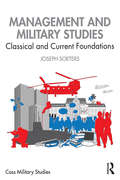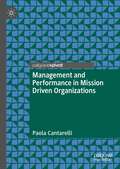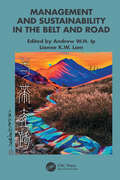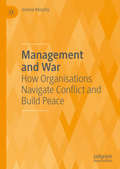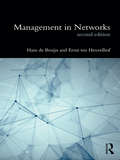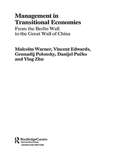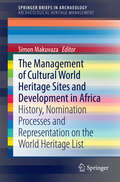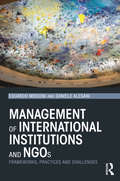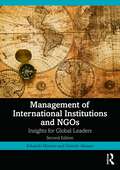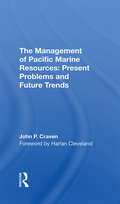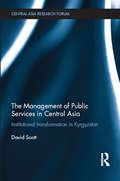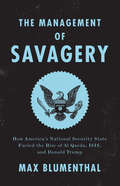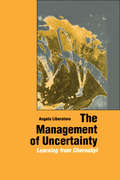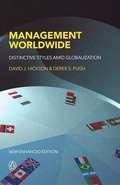- Table View
- List View
Management and Military Studies: Classical and Current Foundations (Cass Military Studies)
by Joseph SoetersThis book connects findings and insights authored by famous scholars in management and organization studies with challenges the military is facing today. One assumes that management and organization studies is only about the rational, predictable, and manageable, and that military action is predominately irrational, unpredictable, and unmanageable; both assumptions are wrong. This book argues that the discipline of management and organization studies is highly relevant for the military in both peace- and wartime conditions, and for any situation in between. In all conditions, the giant and complex military organization needs to be structured, processed, administrated, led, and accounted for. Each chapter presented in this volume focuses on the contributions of founding thinkers in management and organization studies, with their work translated and applied to the military setting. These scholars are drawn from a variety of backgrounds, including organizational sociology, economics, political science, psychology, and engineering. Although the work of only a few explicitly refers to the military, the contributions of all these scholars are relevant in order to come to grips with security and military affairs. Together with many other academics’ work, the contributions of these 18 scholars constitute the core of the field of management and organization studies. This book will be of much interest to students of military studies, management studies, and organization studies.
Management and Performance in Mission Driven Organizations
by Paola CantarelliManagement scholars worldwide increasingly capitalize on theoretical models and research designs from the behavioural sciences to close the implementation gap in mission-driven organisations. This book aims at synthesising the theoretical frameworks and evidence that has flourished over the past decades in order to advance the scholarly debate and the implications for practice in the domains of performance management, information systems, investments strategies, people administration, and change and innovation. It provides meaningful insights to tackle real-world challenges that organizations and their managers face on a daily basis; including why two managers can make radically different decisions in front of the same information, which cognitive traps most often get in the way of good performance management, and how managerial interventions can limit such errors and variability.
Management and Sustainability in the Belt and Road
by Lianne K. W. Lam Andrew W. H. IpChina’s Belt and Road Initiatives (BRI) is an ambitious infrastructure project conceived in 2013 by President Xi Jinping with development and investment initiatives stretching from Asia and Europe that reflect the original Silk Road with business networks through countries such as Afghanistan, Kazakhstan, Kyrgyzstan, Tajikistan, Turkmenistan, and Uzbekistan, as well as India and Pakistan, spanning a route of more than 4,000 miles and history that can be dated back more than 2,200 years. Given the background of China’s unique approach in fighting COVID-19, and against the backdrop of sluggish economic growth, innovation, and management, sustainable development of BRI will be the key and the driving force for the post-pandemic economic recovery of many countries, especially as BRI countries now account for nearly 30% of China’s foreign trade and 15% of outward direct investment. The vision to create a vast network of railways, energy pipelines, highways, and streamlined border crossings to expand the international use of Chinese currency and improve connectivity to China is good foresight and proved fortuitous when the COVID-19 pandemic came to plague the world, and amid the conflicts between the United States and China as well as the war between Russia and Ukraine. Since the inception of BRI, many books have been written to cover topics ranging from globalization to detailing how China’s business and politics are a major motivation for China’s overseas economic activities with case studies and practices, yet few of these books provide a structured approach to the sustainable management of BRI projects. This book is about how to manage the innovation, sustainability, and business necessary to make BRI work and how to handle the issues, problems, and crises that may arise in the process. Participants of BRI projects can take on many different roles, but ultimately, it is team effort and leadership that creates successful projects. Here, readers will find guidelines and insights to survive and prosper in a myriad of BRI opportunities and risks. Most important of all, this book provides a glimpse of different approaches for success in BRI projects, including sustainability, environmental issues, social and political aspects, technology, choice of industry, project management, education and training, governance, and many more.
Management and War: How Organisations Navigate Conflict and Build Peace
by Joanne MurphyWar and conflict are a reality of life throughout the world. While much is written about the impact of violence and disorder, how people and organisations adapt to these environments is poorly understood. This book tells the often hidden story of people managing, delivering services and sustaining economies through and beyond violent conflict. It is written for both general readers and academic specialists, combining first person interviews, insights from ‘witness seminars; and informal conversations with more scholarly research. Building on what we already know about organisational behavior and conflict transformation, the book looks at the delivery of housing and public amenities, the management of public space and commemoration and the role of local businesses during and beyond violent conflict. In particular, it focuses on the role of organisational managers as peacebuilding entrepreneurs, generating and sustaining conflict transformation efforts.
Management in Networks: On Multi-actor Decision Making
by Hans De Bruijn Ernst Ten HeuvelhofGetting what you want – even if you are the boss – isn’t always easy. Almost every organization, big or small, works among a network of competing interests. Whether it’s governments pushing through policies, companies trying to increase profits, or even families deciding where to move house, rarely can decisions be made in isolation from competing interests both within the organization and outside it. In this accessible and straightforward account, Hans de Bruijn and Ernst ten Heuvelhof cast light on multi-stakeholder decision-making. Using plain language, they reveal the nuts and bolts of decision-making within the numerous dilemmas and tensions at work. Drawing on a diverse range of illustrative examples throughout, their perceptive analysis examines how different interests can either support or block change, and the strategies available for managing a variety of stakeholders. The second edition of Management in Networks incorporates a wider spread of international cases, a new chapter giving an overview of different network types, and a new chapter looking at digital governance and the impact of big data on networks. This insightful text is invaluable reading for students of management and organizational studies, plus practitioners – or actors – operating in a range of contexts.
Management in Transitional Economies: From the Berlin Wall to the Great Wall of China
by Vincent Edwards Gennadij Polonsky Danijel Pucko Malcolm Warner Ying ZhuBased on extensive research, this comparative study examines the past, present and future of management in the transitional economies of East and Central Europe, Russia, the People's Republic of China, and Vietnam. It discusses the nature of the transition process, identifying different transition paths, highlighting common features and outlining useful theoretical approaches. Each chapter covers a wide range of aspects of management in the countries covered, including details of the historical and cultural background, the transition process, and both external and internal factors, and the macro and micro situation. Its multidisciplinary approach, makes this book suitable for both a practitioner and an academic readership
The Management Of Cultural World Heritage Sites and Development In Africa
by Simon MakuvazaEver since the signing of the World Heritage Convention 40 years ago and ratified by 33 African countries, to date, only 43 cultural heritage sites have been successfully proclaimed as World Heritage Sites in Africa. These include archaeological and historical sites, religious monuments and cultural landscapes This book is a re-evaluation of the nomination and management of cultural World Heritage sites in Africa from the late 1970s when the Island of Gorée of Senegal and the Rock-Hewn Churches of Ethiopia were first inscribed on the WHL until today It considers whether a credible and well balanced WHL has been attained, especially in regards to the nomination of more sites in Africa. The book also examines the roles and contribution of various heritage organizations and African governments to the nomination and management of cultural World Heritage sites in Africa. Lastly, the volume also scrutinizes economic development, which may result from the nomination and successful management of cultural World Heritage sites in Africa.
Management of Health Risks from Environment and Food
by Hajime SatoThis book examines the policy and politics of two health risks, which have recently become prominent social issues in many countries. One is the issue of asbestos as an environmental risk to humans, and another is that of bovine spongiform encephalitis (BSE), or mad cow disease as an animal disease, and of its variant Creutzfeldt-Jakob disease (CJD) as a human food risk. Employing a set of analytical frameworks in political science, each case study explores how the issues emerged, agendas got set, alternatives were chosen, and policies were implemented. Through the analysis, it is examined how safety and public reassurance were pursued in the countries studied (Japan, the UK, France the USA, and Korea). Exploration of the successes and failures in their efforts discloses the key elements to successful health risk management.
Management of International Institutions and NGOs: Frameworks, practices and challenges
by Eduardo Missoni Daniele AlesaniInternational Institutions (IIs), International NGOs (INGOs) and Transnational Hybrid Organizations (THOs) play a hugely important role in the modern world economy. Despite having been studied by scholars from a range of disciplines, these organizations have never before been approached from a management perspective. This ambitious book analyzes the management challenges associated with international cooperation and sheds light on how these organizations have evolved as the political, economic and business environments have changed around them. Covering an admirably broad canvas, the authors pursue two main objectives. Firstly, they explore the main management frameworks developed in the context of the corporate and national public/non-profit organizations and adapt them to the specificity of IIs and INGOs. This leads to the identification of a "tailored" approach to IO management based on their institutional and operational settings, stakeholder groups, core business, staff profile, and financial arrangements. Secondly, they "bring theory into practice" by linking frameworks to several case studies and best practices of organizations currently experimenting with management systems and tools, with case studies including the World Bank and the Gates Foundation. This comprehensive textbook is a must-own resource for students and academics involved with studying and working with international organizations.
Management of International Institutions and NGOs: Insights for Global Leaders
by Eduardo Missoni Daniele AlesaniThis second edition of Management of International Institutions and NGOs covers all key topics in global governance from a unique management perspective. It analyzes the management challenges associated with international cooperation rather than the more commonly explored political or economic lenses. This text is structured to enable students to connect theory with practice, beginning with the main management frameworks developed in the context of corporate and national public/nonprofit organizations and adapting them to the specificity of international institutions and international non-governmental organizations. This leads to the identification of a “tailored” approach to international organization management based on their institutional and operational settings, stakeholder groups, core business, staff profiles, and financial arrangements. The authors then connect this theory with practice by linking frameworks to several case studies and best practices of organizations currently experimenting with management systems and tools, with case studies including the World Bank and the Gates Foundation. This edition has been extensively revised and updated, with an expanded conceptual framework inclusive of systemic theories of organization, new cases throughout, and new chapters on leadership, supply chain and operations, and human-centered digitization. This comprehensive textbook is a must-own resource for students and academics involved with studying and working with international organizations.
The Management Of Pacific Marine Resources: Present Problems And Future Trends
by John P CravenThe mineral, food, and energy potential of the oceans increases in importance as land-based resources approach their ultimate limits. International planning for the utilization of common ocean areas beyond territorial waters has thus become a vital task, one made difficult by competition among nations and the unregulated operations of multinational
The Management of Public Services in Central Asia: Institutional Transformation in Kyrgyzstan (Central Asia Research Forum)
by David ScottThe ending of the Soviet Union in 1991 had a major political and economic impact on Central Asia. Kyrgyzstan was one of the most severely affected countries, suffering a deeper recession than the other republics. During the first five or six years Kyrgyzstan followed the advice of the International Monetary Fund and was considered a model of both economic and political reform. This book analyses the ability of the newly independent government in Kyrgyzstan to create a realistic national vision, prepare a strategy, organise and control its public services to deliver the desired result. Covering a fifteen year period and using the case study of the educational sector – which declined even though the economic situation in Kyrgyzstan improved – the author throws light on many other aspects of a country in transition, in particular, on strategy, implementation and outcomes. Comparisons with other sectors such as roads and pensions, and in particular the health care sector are presented. A multifaceted approach using case studies, phenomenology, interviews, historical and comparative analyses offers a more complete picture of national management of public service and the structure of government administration. The book also investigates the contribution made by the international aid organisations. A detailed study of institutional transformation in Kyrgyzstan, this book is of interest to academics studying former socialist countries in transition, the history of the Soviet Union and Central Asian studies in general.
The Management of Purpose
by Lewis Anthony DexterLewis Anthony Dexter may well have been one of the better known and least appreciated political scientists of the last century. This outstanding collection of Dexter's writings, demonstrates why Dexter remains important. The volume off ers solid reasons for researching the topics Dexter pioneered, and is a masterful guide to his thought and analyses. Dexter's writings derive from a multifaceted career. The Management of Purpose is organized into three broad subject areas: sociology, political science, and practicing social science. Dexter's notions of what constituted sociology and anthropology and his understandings of these areas and how to use them to illumine political matters are unusual. His use of multiple types of evidence, including history and logic, enables him to make significant contributions to the study of society's response to social problems. His work on labeling theory shows that social labels have a power that both transcends and distorts reality. Dexter was also a pioneer in the interactionist perspective, linking the labeled and those doing the labeling, and in demonstrating how organizations tend to compartmentalize and specialize. Dexter's work provides the analytic tools to enable readers to better understand many of the issues that remain a part of the American political landscape.
Management of Recreation and Nature Based Tourism in European Forests
by Veronika Wirth Simon Bell Ulrike Pröbstl Birgit H. ElandsThis book provides for the first time a Europe-wide overview on the state of the art of management of recreation and nature tourism in forests. It describes the current situation and conflicts in the different regions of Europe and provides solutions illustrated by good practise examples. It addresses traditions, differences and similarities in European forests as well as new tasks, goals and strategies. The final discussion provides a profound insight into future trends regarding forest recreation and nature based tourism.
Management of Regeneration: Choices, Challenges and Dilemmas
by John Diamond Joyce LiddleStemming from a need to understand strategic processes, examine current practices, and identify the needs of regeneration management professionals, this book cites current regeneration management practice within a framework which critically examines the theoretical models developed over the past twenty years. It features illustrative case studies, learning objectives, key themes boxes, and review and reflection segments, and explains strategic processes and new forms of local, sub-regional and regional management. It also investigates the development and extension of the roles of regeneration managers (which increasingly illustrate the uneven and contradictory nature of this subject), and raises important issues regarding how such individuals are supported and developed. This book: examines current initiatives in order to present good practice provides practitioners and students with an understanding of the choices, challenges and dilemmas faced by regeneration managers focuses on the themes of partnership, capacity building and community engagement, participation and sustainability has an accompanying web page featuring downloadable PowerPoint slides and test blanks. A valuable resource for public sector managers, and urban management professionals, this book synthesises strategic literature and applies it within a changing local, sub regional and regional governance system. Providing a clear framework within which new models of strategy and implementation can be found, it presents a balanced approach between existing theory and practical case material.
The Management of Savagery: How America's National Security State Fueled the Rise of Al Qaeda, ISIS, and Donald Trump
by Max BlumenthalThe rise of international jihad and Western ultra-nationalismIn the Management of Savagery, Max Blumenthal excavates the real story behind America’s dealings with the world and shows how the extremist forces that now threaten peace across the globe are the inevitable flowering of America’s imperial designs. Washington’s secret funding of the mujahedin provoked the Russian invasion of Afghanistan in 1979. With guns and money, the United States has ever since sustained the extremists, including Osama Bin Laden, who have become its enemies. The Pentagon has trained and armed jihadist elements in Afghanistan, Syria, and Libya; it has launched military interventions to change regimes in the Middle East. In doing so, it created fertile ground for the Islamic State and brought foreign conflicts home to American soil. These failed wars abroad have made the United States more vulnerable to both terrorism as well as native ultra-nationalism. The Trump presidency is the inevitable consequence of neoconservative imperialism in the post–Cold War age. Trump’s dealings in the Middle East are likely only to exacerbate the situation.
The Management Of Success: The Moulding Of Modern Singapore
by Kernial Singh Sandhu Paul Wheatley Kernial Singh Sandhu (A)A collection of analytical reflections on how the island of Singapore has been transformed from a colony in a crumbling empire into a thriving, modern, secular, independent republic. These are the results of a five-year project by the Institute of Southeast Asian Studies.
The Management of Uncertainty: Learning from Chernobyl
by Angela LiberatoreThis investigative analysis studies why key European countries responded differently to the Chernobyl nuclear disaster, and what can be learned from it.The author details why the accident was defined differently in various countries, why actions were or were not taken, and what was learned about the management of nuclear risk. Furthermore, Liberatore studies the short-term and long-term responses and consequences of Chernobyl not only in specific countries, but within the European Union as a whole. Liberatore also provides a policy communication model to illustrate the interaction among the key personnel in such incidents: the scientists, the politicians, the interest groups, and the mass media. The author's focus upon uncertainty managementis a compelling account for all who seek to understand and improve the practical management of transboundary risks.
The Management of Wicked Problems in Health and Social Care (Routledge Studies in Health Management)
by Will Thomas Anneli Hujala Sanna Laulainen Robert McMurrayAt a time of growing pressure on health and social care services, this book draws together contributions which highlight contemporary challenges for their management. Providing a range of contributions that draw on a Critical Management Studies perspective the book raises macro-level concerns with theory, demographics and economics on the one hand, as well as micro-level challenges of leadership, voice and engagement on the other. Rather than being an attempt to define the ‘wickedness’ of problems in this field, this book provides new insights designed to be of interest and value to researchers, students and managers. Contributions from international researchers explore four main topics: identifying contemporary challenges in health and social care; managing, leading and following; listening to silent voices in delivering change; and new methodologies for understanding care challenges. The concerns discussed in this volume are ‘wicked’ in so far as they are persistent, pernicious and beyond the curative abilities of any single organisation or profession. Such problems require collaboration but also new approaches to listening to those who suffer their effects. This book demonstrates such listening through its engagement with policy makers, leaders, followers, professions, patients, forgotten groups and silenced voices. Moreover, it considers how future research might be transformed so as to shine a more inclusive light on ‘wicked’ problems and their amelioration. This is a timely and engaging book that challenges you – the reader – to think again about how we should look at, engage with and support all those involved in health and social care.
Management Policies in Local Government Finance (5th edition)
by J. Richard Aronson Eli SchwartzWritten for all practitioners of local government finance, ICMA¿s Management Policies in Local Government Finance has long been considered the most comprehensive, most on-target text for local government managers, finance directors, and economic development planners and directors. Now in its fifth edition, this classic on financial management will help you: Develop new revenue sources Design a budget process that includes performance reporting Conduct strategic economic development Understand debt management and bond sales Use modern information systems to improve financial decisions Meet the day-to-day challenges of financial management, from procurement to labor negotiations. Completely new chapters in this revised edition address school finance, cost-benefit analysis, enterprise resource management systems, procurement, cash and investment management, and risk and insurance management. All chapters have been thoroughly updated to reflect changes in federal and state practice, new professional guidelines, and underlying changes in global and national economies.
Management Worldwide: Distinctive Styles Among Globalization
by David J. Hickson Derek S. PughBusinesses today need employees who can operate on a global stage, whether as international managers, technical specialists, expatriates or 'parachutists' who make occasional troubleshooting trips abroad. Yet cultural misunderstandings in the workplace can complicate even the simplest tasks. Something that sounds like a 'Yes' to a foreigner may actually be a polite way of saying 'No'. Fully updated and expanded for this second edition, Management Worldwide is essential for managers, students ofmanagement and organizations who want to know how managers operate and business is conducted in different societies. It is essential reading in a global economy where cultural differences can still mean make or break.
Manager Empowerment in China: Political Implications of Rural Industrialisation in the Reform Era (Routledge Studies on China in Transition #Vol. 14)
by Ray YepInstitutional changes in rural China caused by the economic reforms of the post-Mao era have led to a new pattern of state-society interaction in the rural polity. Central to this is the spectacular rise of a group of managerial elites. Contrary to economic predictors, this has been accompanied by the development of an interdependence between these managers and the state. This book provides an analysis of the new state-society relationship and demonstrates the complexity and fluidity involved in institutional development and market transformation.
Managerial Cultures in UK Further and Vocational Education: Transforming Techno-Rationalism into Collaboration
by John Baldwin Neil Raven Robin Webber - JonesThis book offers unique insights into the impact of the rise of a managerialist culture in Further Adult and Vocational Education (FAVE) in England. It will also raise awareness of the consequences of the imposition of top-down models of educational change and improvement upon the practices of educational leaders, middle and senior managers and policy professionals across the FAVE sector. The overall aim of this book is to understand the language, policies, values and approaches currently espoused in post-16 learning. Often these are driven by, or measured by, technical-rational approaches which can have a negative impact on individuals working in the sector, lead to a narrowing of the curriculum and range of assessment opportunities, and do not support student progression. The authors propose tentative, researched, and evidence-based suggestions for new ways of working which might, ultimately, have a significant benefit to post-16 learning. The book will appeal to those engaged in researching education – either as academics, policy makers, trainees, or practitioners who are interested in ways of reflecting on, researching into, and improving practice.
Managerialism
by Thomas KlikauerMost people know what management is but often people have vague ideas about Manageralism. This book introduces Manageralism and its ideology as a colonising project that has infiltrated nearly every eventuality of human society.
Managerialism in the Public Sector: Perspectives and Prospects (Routledge-Giappichelli Studies in Business and Management)
by Andrea TomoThe purpose of this book is to offer insights into the complex and often unclear context of public sector management, providing a new theoretical and practical approach to the analysis and interpretation of these issues. The book is grounded in the awareness that the public sector has too often shown inefficiencies, despite the expensive measures taken, and from manifold perspectives such as the economic, social, organizational, and institutional ones, among others. It acknowledges the lack of behavioral, cultural, and context-oriented research in the field, thus proposing to innovate the debate and to expand the current understanding of which organizational features characterize modern public administrations, what factors influence the predominance of different models, with a special focus on the Italian setting, benefiting from a wholly comprehensive innovative methodological approach. The findings offer key implications for theory, practice, and policy-making, contending the importance of holistic approaches to the debate and abandoning pre-constituted schemes to put forth the relevance of behavioral models. It offers a key message: contextual-specific and cultural factors influencing individual behaviors are important and should better influence policy-making processes, towards "glocalization" in order to improve quality.
